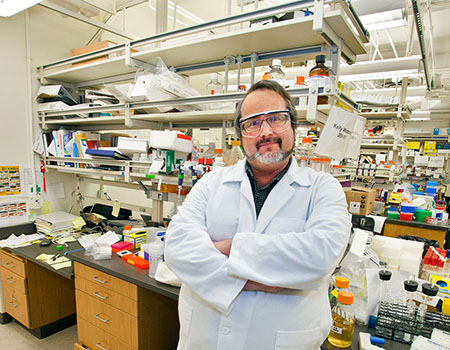Adam Arkin: Synthetic biology innovator
Synthetic biology holds great promise for solving many of the world’s challenges, including areas such as sustainable energy, pharmaceuticals and toxic waste clean-up. The idea is to apply principles of engineering to biology: taking components of natural biological systems, characterizing and simplifying them, then using these parts to engineer a new biological system. But before the field can achieve these lofty goals, the design and construction of biological systems must be predictable.

Adam Arkin in his lab at Hildebrand Hall on UC Berkeley campus.
Adam Arkin, professor of bioengineering, has pioneered the creation of frameworks to facilitate the design and engineering of new functions and behaviors in cells through synthetic biology. He’s best known as an innovator in developing the physical theory, computational tools and experimental approaches used in this field, as well as for his work in uncovering the evolutionary design principals behind cellular networks and populations.
Early in his career, Arkin created a computer model connecting the arrows of the genetic circuit that controls when a bacteriophage virus decides to begin reproducing. This groundbreaking result proved that virus decision is determined largely by chance chemical events and earned him the title of “Future Innovator” in a special issue of Time magazine in 2000, as well as a spot in the 1999 class of Technology Review’s TR100.
In 2013, a multi-institutional partnership called BIOFAB, co-founded by Arkin, released the first-ever package of public domain DNA sequences and statistical models that increased the reliability and precision by which biological systems could be engineered. That year, he also co-authored a paper that challenged the orthodoxy of microbiology, confirming that bacteria in the laboratory show little evidence of adaptive genetic response.
Now, Arkin is taking his work to space. As lead of the NASA Center for the Utilization of Biological Engineering in Space (CUBES), he’s applying his synthetic biology expertise to produce fuel, materials, pharmaceuticals and food on long-term space missions.
In recognition of his cutting-edge work, Arkin has received numerous honors. In 2007, he was elected a Fellow in the American Academy of Microbiology, and in 2013, he was one of six recipients of the Ernest Orlando Lawrence Award, the Department of Energy’s highest scientific honor. In 2017, the Double Barcoded Shotgun Expression Library Sequencing (Dub-seq), a tool for discovering the functions of genes in microbes under different environmental conditions, which Arkin co-developed, won an R&D 100 Award for cutting-edge technology.
In addition to his work on campus, Arkin also currently serves as the principal investigator of The Department of Energy Systems Biology Knowledgebase (KBase), Technical Co-Manager of the ENIGMA SFA, directs the Synthetic Biology Institute and is an investigator of the Energy Biosciences Institute.
< Back to previous page